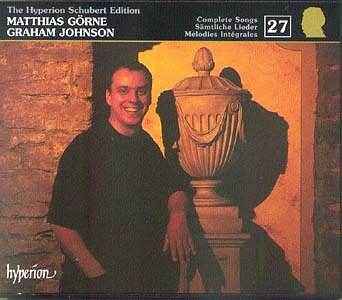SCHUBERT
Complete Songs Vol.27
 Matthais Gorne (baritone) Christine Schafer (soprano)
Graham Johnson (piano)
Matthais Gorne (baritone) Christine Schafer (soprano)
Graham Johnson (piano)
 The Hyperion Schubert Edition Hyperion CDJ33027 78'11"
The Hyperion Schubert Edition Hyperion CDJ33027 78'11"
Crotchet
Amazon
UK Amazon USA

Lob der Tränen, D711. Lebensmelodien, D395. Sprache der Liebe,
D410. Wiedersehn, D855. Sonett I, D628. Sonett II, D629. Sonett III, D630.
Abendröte, D690. Die Berge, D634. Die Vögel, D691. Der Fluss D693.
Der Knabe, D692. Die Rose, D745. Der Schmetterling, D633. Der Wanderer, D649.
Das Mädchen, D652. Die Sterne, D684. Die Gebüsche, D646. Blanka,
D631. Der Schiffer, D694. Fülle der Liebe, D854. Im Walde (Waldesnacht),
D708
There may still be just a few readers unfamiliar with this series, one of
the record industry's all-time most important projects and achievements,
now nearing completion. They should hurry to acquire one of the steadily
accumulated volumes, and this one is an excellent starting point.
Graham Johnson's Hyperion Schubert Edition is a worthy sequel to the
monumental earlier collection by Fischer-Dieskau. Most leading lieder singers
of the period during which the project has matured are represented, and some
of the songs are recorded more than once, with variants explained in Johnson's
encyclopaedic commentaries. There is in every volume the joy of discovery,
and Johnson has told how he surprised himself again and again by finding
that seemingly simple and insignificant strophic songs reveal Schubert's
genius only in performance.
This volume includes none of Schubert's more famous or popular songs, being
devoted to settings of poems by the brothers Schlegel, whom (says Graham
Johnson) the average English-speaking listener is even less likely to know
about than Hegel - - 'and even more likely to know (or care) about neither'!
He provides with each CD a learned, elegantly written booklet, with full
texts and translations, and lengthy essays about the poets and their place
in Schubert's life. Here there are twelve pages (in very small print) to
tell us all about the Schlegels, August and Friedrich, and then each song
has a line by line analysis drawing attention to its every felicity. So expansive
have these literary contributions become latterly that this book(let) runs
to over 70 pages, which reward careful reading and it is packaged into a
new style container with more space than a jewel-case allows.
The generous 78 minutes recital accordingly claims double or more time's
attention than that figure might indicate. Ideally, for orientation one should
start with an overview of the introduction to the whole volume, then hear
the songs with the texts and translations in front of you (the commentaries
upon each are printed afterwards, sensibly encouraging you to skip them first
time). This is quite demanding, and breaks are recommended.
Next, take the songs again one by one (making constant use of the Pause facility)
reading the commentary and identifying the points (most of which would elude
you otherwise) to which Johnson draws attention. The Hyperion Edition does
not encourage superficial listening to Schubert!
Matthias Gorne is one of the inheritors of Fischer-Dieskau's mantle, and
undoubtedly one of the finest lieder singers now before the public, his
mellifluous voice in its prime. He begins with four songs to poems by the
elder Schlegel, August (1767-1845) and follows with two of his Petrarch
translations (a reminder that August Schlegel was a peerless translator,
whose Shakespeare in German has been claimed as better than the original!).
He finishes the recital with three songs to Friedrich Schlegel (1772-1829).
Between those groups is a sequence of 11 songs collectively described as
The 'Abendrote' cycle of Friedrich von Schlegel. This is not a fully
formed and recognised cycle and Graham Johnson discusses fully the issues
which surround it. The first group has emotions attributed to nature, its
plants and animals (Ruskin's 'pathetic fallacy') to convey the unity of creation.
The second part takes place after night has fallen.
In this CD volume, the single baritone voice is contrasted in four songs
by the ecstatic, high soprano of Christine Schafer, who is able to
meet with ease the requirement in Der Fluss for 'a highly-placed voice
with an ability to spin a line - - piano and pianissimo - - with
a blend of formidable bel canto technique with Lieder-singing
sensibility'. No present day singer can deliver all that better than Schafer,
whom I have admired recently in Straussian operatic coloratura
[S&H,
March 2000] and
in a solo CD of French chansons
[DG
459 682-2 *****]
All the songs in the entire series are accompanied by Graham Johnson
himself. He brings formidable skill and subtlety to his playing, informed
by his depth of understanding of the composer with whom he has spent so many
hundreds of hours that he can call on what he characterises as 'the deeply
embedded memory of the Schubertian - players know that there is such a
thing''. A sense of wonder is retained throughout by all concerned and
there is no routine singing or playing to meet a schedule or complete an
assignment.
These CDs are certain to remain collectors items, indeed treasures, for the
foreseeable future, and I anticipate that Graham Johnson's texts will be
collected in book form and become indispensable for all students and lovers
of Schubert.
Reviewer
Peter Grahame Woolf

